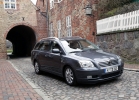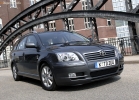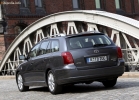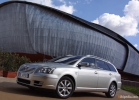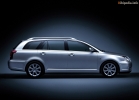Toyota Avensol Crash Test Toyota 2003 - 2006 station wagon
Toyota Avensol Krash Test Skag 2003, 2004, 2005, 2006: Laborator assessment of car safety: rating in points, report on the test (photo and video of the crash test)
34%
Driver and passengers
8%
Pedestrians
Protection of the driver and passenger
 Frontal blow, driver |
 Loba blow, passenger |
 Side blow, driver |
|
Children's holding devices
| Child up to 18 months | Britax Roemer Baby-Safe, face back |
| A child over 3 years old | Britax Roemer Duo, facing forward |
Safety of pedestrians
 |
|
Comments:
Avensis provides its passengers with security. The body did not deform significantly and provided maximum protection during a lateral blow. Assessment for protection in a frontal strike is only two points less than the maximum. The anterior airbag ensured reliable contact with the driver's head. The pillow of safety of the knee is triggered during collisions at speeds above 25 km/h and effectively protects the driver's legs. The Toyota Avensis has a alarm about the non -set seat belts. A children's chair for a 3-year-old passenger was fixed using ISOFIX locks and a safety strap, but experts found shortcomings in his work. Pedestrians are poorly protected, very little attention is paid to the safety of their knees and legs.Frontal blow:
The front airbags are inflated in two stages, increasing pressure with serious clashes. The driver’s safety pillow takes into account its weight, adjusting the strength of the shot. Protection of the chest, head and neck of both front riders was good. The safety of the knees and legs of the driver is also paid enough attention, and the airbag in this zone showed a good result. The driver’s niche has a filler that protects it from strong compression. The central place of the back row of seats is equipped with a three -point seat belt that provides better protection compared to waist.Safety of passenger children:
The danger of installing a children's chair “Against the direction of movement” opposite the airbag was reported by durable warnings. All three rear seat belts could be used for a more reliable fixation of children's seats. A 3-year-old chair was located “in the direction of movement” in ISOFIX mounts, also fixed with the help of a safety strap. It defended the child’s head well at the frontal impact, which cannot be said about the side blow. The junior passenger was placed in the chair “against the direction of movement”, and his head was protected well, but heavy loads acted on his chest and neck.Side blow:
The protection system when hitting the side included side pillows and safus curtains that protect the riders of both rows. In this category, the car scored the maximum number of points.Pedestrian safety:
The bumper and the front edge of the hood did not provide any mitigation of the blow, but the lower central part of the hood was quite safe, protecting the head of the downed child.General information about the car
| The location of the steering wheel | On right |
| Tested model | Toyota Avensis 1.8 |
| Type of body | 4-door sedan |
| Year of data publication | 2003 |
| Curb weight | 1245 |
Safety system equipment:
| Front seat belts | There is |
| Front seat belts load limiters | There is |
| Front Pillow of Safety of the driver | There is |
| Passenger front pillow | There is |
| Side airbags | There is |
| Side pillows of head safety pillows | There is |
| Knee -off pillow and legs of the driver | There is |

